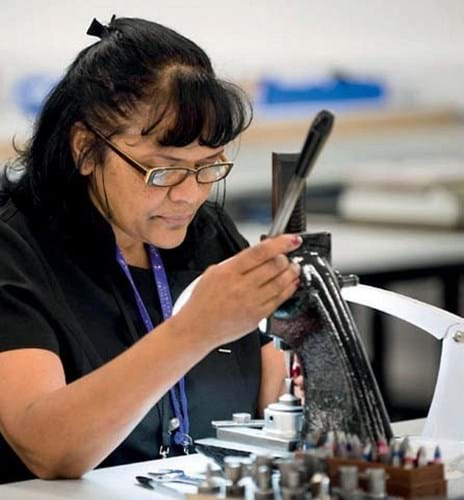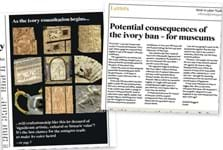
Discussions are now taking place with the Assay Offices in London, Birmingham, Sheffield and Edinburgh over what form the offshore mark should take. Once agreed it will be implemented within one year, said the BHC.
Campaigners against the ‘outsourcing’ of hallmarks have welcomed the decision which followed a consultation on the issue last year that generated over 120 responses.
John Langford, a silversmith and jeweller who is a member of the British Hallmarking Protection Alliance said: “I’m glad the historical and moral importance of having UK hallmarks only applied to items marked in the UK has been recognised. The new overseas marks must be sufficiently different so that members of the public, not just the trade, will be able to tell them apart.”
Consumer clarity
Speaking to ATG, chairman of the BHC Noel Hunter said: “We’ve had extensive discussions on this issue with different views expressed. The practice [of overseas hallmarking] was established in 2014 following a government order and sub-offices have since been set up overseas. This decision means these operations will continue but it changes the policy relating to the marks.”
He added that the council concluded that making the marks distinguishable was “in the interests of consumer clarity” and that the council’s vote was unanimous.
Another key factor in the decision however was that EU countries have started raising concerns about this issue. In one case, heard at the European Court of Justice in 2016 relating to Dutch hallmarks applied overseas, a judge ruled that EU member states were not required to accept marks applied outside the EU as offering an equivalent level of guarantee.

The anchor symbol is the traditional mark to denote an item has been assayed in Birmingham. Image credit: Assay Office Birmingham.
The use of Birmingham Assay Office’s (BAO) traditional anchor symbol by a sub-division in Mumbai featured prominently among the issues highlighted by campaigners.
The British Hallmarking Protection Alliance, which is supported by 80 manufactures and retailers from around the country, said in a statement: “The scenario was raised where products could be made and assayed with UK hallmarks in countries not recognised by the EU or the International Hallmarking Convention as having an equivalent standard of assay reliability and then imported directly into the EU for sale.”
Steve Millington of Birmingham silverware manufacturers L.J. Millington said the BHC’s change of policy was “a good decision to correct a poor one taken several years ago”.
“I find it disappointing that the management of BAO thought it was a good idea to devalue 245 years of history and heritage,” he said.
Assay Master at BAO, Doug Henry, said that there was “no question that BAO have always been fully compliant in all respects with the Hallmarking Act and all BHC policies and regulations” and that there had been a “great deal of misinformation propagated throughout this debate”.
Statement from Assay Master at Birmingham Doug Henry in full:
“We are pleased that all parties within the BHC have reached agreement around a very complex issue. One cannot underestimate the complexities of minor changes to regulations across the international markets.
"The agreement came about as a result of a proposal by BAO and very honest yet constructive dialogue to further UK hallmarking. The 2016 ECJ has been a significant factor in the debate around protecting consumers and the interests of UK hallmarking in general.
"There is no question that BAO have always been fully compliant in all respects with the Hallmarking Act and all BHC policies and regulations. Although we accept that there has been a great deal of misinformation propagated throughout this debate. The change in policy now agreed within the BHC will not change this fundamental position as the integrity of this office is paramount, and we will always be fully compliant with legislation and regulation.
“We appreciate the views of the interested parties in the debate and the BHC have taken all of these into account when determining the change in policy. Now that this issue is finally resolved we look forward to ensuring that UK Hallmarking remains at the forefront of consumer protection in all markets. In this respect also we will continue to work diligently with our colleagues in the industry to further the jewellery trade and to raise the profile of the value of hallmarking as such a critical element in consumer protection in particular through internet sales.”














